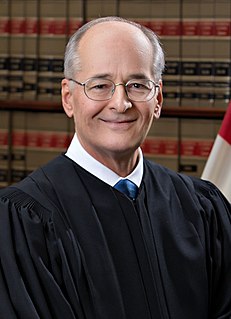A Quote by Michel Temer
Impeachment is allowed under Brazil's Constitution.
Quote Topics
Related Quotes
Impeachment must not be a raw exercise of political power in which the House impeaches whoever it wishes for any reason it deems sufficient. Indeed, it is the solemn duty of all of the members of the House in any impeachment case to exercise their judgment faithfully within the confines established by our Constitution.
Impeachment appears six times in the U.S. Constitution. The Founders weren't concerned with anything more than with impeachment because they had lived under King George III and had in 1776 accused the king of all the things that George W. Bush wants to do: Usurpation of the power of the people; Being above the law; Criminal abuse of authority.
Article I, Section 8, of the Constitution, of course, lays out the delegated, enumerated, and therefore limited powers of Congress. Only through a deliberate misreading of the general welfare and commerce clauses of the Constitution has the federal government been allowed to overreach its authority and extend its tendrils into every corner of civil society.






























